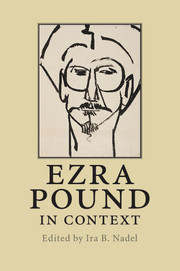Book contents
- Frontmatter
- Contents
- Notes on contributors
- Acknowledgements
- Chronology
- List of abbreviations and note on references to The Cantos
- Introduction
- Part I Biography and works
- Part II Historical and cultural context
- 16 The classics
- 17 Provençal and the troubadours
- 18 Dante and early Italian poetry
- 19 America
- 20 Venice
- 21 London
- 22 Paris
- 23 Rapallo and Rome
- 24 Pisa
- 25 Imagism
- 26 Vorticism
- 27 Music
- 28 Visual arts
- 29 Confucius
- 30 The Orient
- 31 Little magazines
- 32 Publishing and publishers
- 33 Modernism
- 34 Fascism
- 35 Anti-Semitism
- 36 Gender and sexuality
- 37 Race
- 38 Travel
- Part III Critical reception
- Further reading
- Index
24 - Pisa
Published online by Cambridge University Press: 05 July 2014
- Frontmatter
- Contents
- Notes on contributors
- Acknowledgements
- Chronology
- List of abbreviations and note on references to The Cantos
- Introduction
- Part I Biography and works
- Part II Historical and cultural context
- 16 The classics
- 17 Provençal and the troubadours
- 18 Dante and early Italian poetry
- 19 America
- 20 Venice
- 21 London
- 22 Paris
- 23 Rapallo and Rome
- 24 Pisa
- 25 Imagism
- 26 Vorticism
- 27 Music
- 28 Visual arts
- 29 Confucius
- 30 The Orient
- 31 Little magazines
- 32 Publishing and publishers
- 33 Modernism
- 34 Fascism
- 35 Anti-Semitism
- 36 Gender and sexuality
- 37 Race
- 38 Travel
- Part III Critical reception
- Further reading
- Index
Summary
INTRODUCTION: TOWARD THE PISAN CANTOS
The Pisan Cantos, composed while Pound was incarcerated in the US Army Disciplinary Training Center (DTC) near Pisa in the summer of 1945, trail a long prehistory. In the late twenties and thirties Pound started preparing for the philosophical Paradiso with which he intended to conclude The Cantos. After 1939, though, while he was still assembling his materials, the war changed everything. Especially after the heavy Allied bombardment of Northern Italy during the last two years of World War II, Pound's focus turned from philosophy toward history. Lamenting the ruin of Italy's cultural patrimony, he composed a suite of poems in Italian beginning with what are now Cantos lxxii and lxxiii and including still unpublished texts that echo through the poem we know.
Throughout the complex evolution of Pound's Italian and English compositions, his preoccupation with memory persists. Pound's philosophical preparations concern the way memory can reunite us with our divine beginnings. The wartime Italian writings stress the power of monuments to consolidate what is sometimes called collective or cultural memory. And in The Pisan Cantos themselves, Pound joins both to an urgent struggle to retain his deepest self, producing a suite whose lineaments his wife Dorothy recognized immediately upon receiving it in the post. These Cantos, she wrote him back, are “your self, the memories that make up yr. person” (LC, 131).
- Type
- Chapter
- Information
- Ezra Pound in Context , pp. 261 - 273Publisher: Cambridge University PressPrint publication year: 2010



